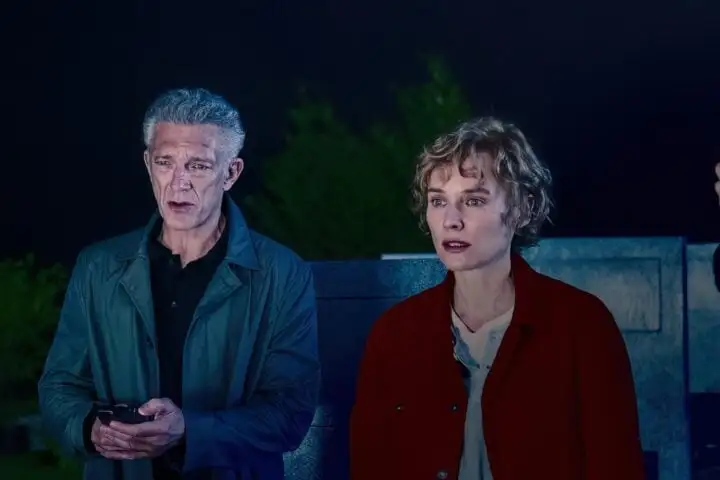Much of the press about The Shrouds since its world premiere at the Cannes Film Festival earlier this year has focused on the deeply personal inspiration for the film: David Cronenberg’s grief over the death of his wife in 2017. For those who are aware of this context going in, one could see signs of that extra investment on the writer-director’s part here and there, especially in the way one of the film’s stars, Vincent Cassel, is made up to look like Cronenberg himself. Lest that suggests something more overtly emotional than what one might expect from the Canadian auteur, though, The Shrouds dispels that notion very early on.
The film’s opening credits sequence features a bunch of swirling dots that eventually form into the outline of a woman. Allied with the insinuating low-pitched electronic droning of Howard Shore’s score, the sequence dissolves into a dreamy vision of a man looking into the prehistoric-looking underground surroundings of a nude female corpse before Douglas Koch’s camera zooms right into the yelling man’s mouth and snaps us back into reality: to Karsh Relikh (Cassel) having his teeth inspected by his dentist, Dr. Hofstra (Eric Weinthal).
Not only are we in distinctly Cronenbergian territory here, with the director thrusting forbidding bodily imagery in front of us, but as the film goes on, it becomes clear that we’re in distinctly late-Cronenbergian territory. Some of what The Shrouds shares with his previous film, Crimes of the Future, is stylistic in nature. Instead of the memorably outré sights of his earlier work, both films are abundant in dialogue scenes, in which important events are generally talked about rather than directly shown. Christopher Donaldson’s editing rhythms are relaxed, Koch’s cinematography almost unnerving in its digital clarity. Both films share broadly similar thematic obsessions as well: an alternately intrigued and critical fascination with the ways technology encroaches on humanity, a paranoid interest in rooting out underlying conspiracies.


